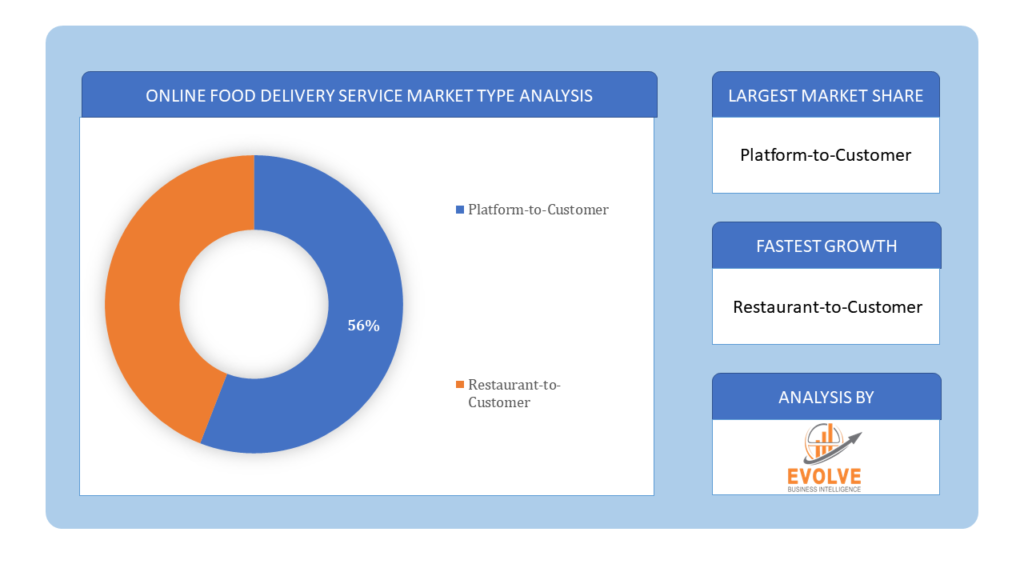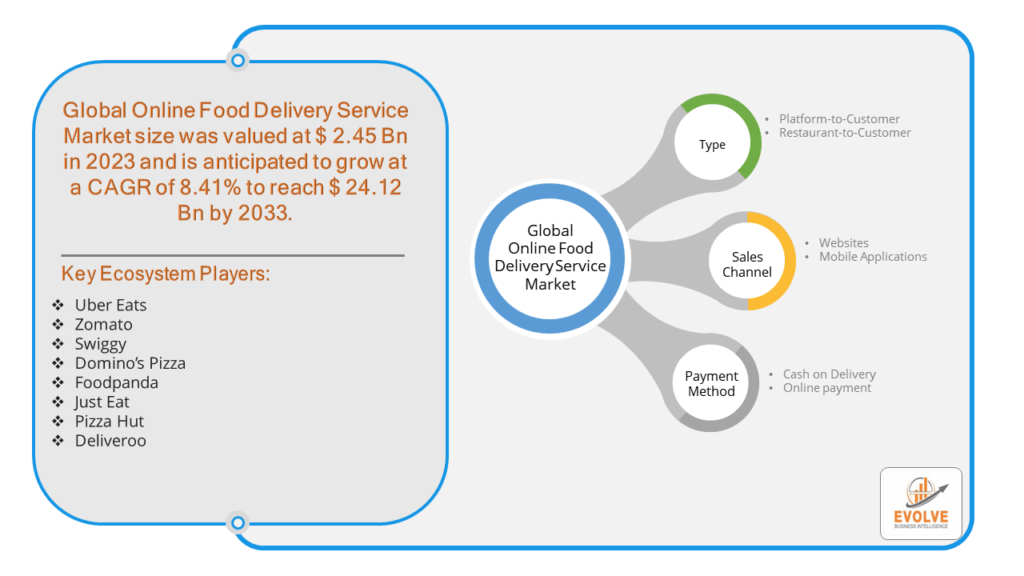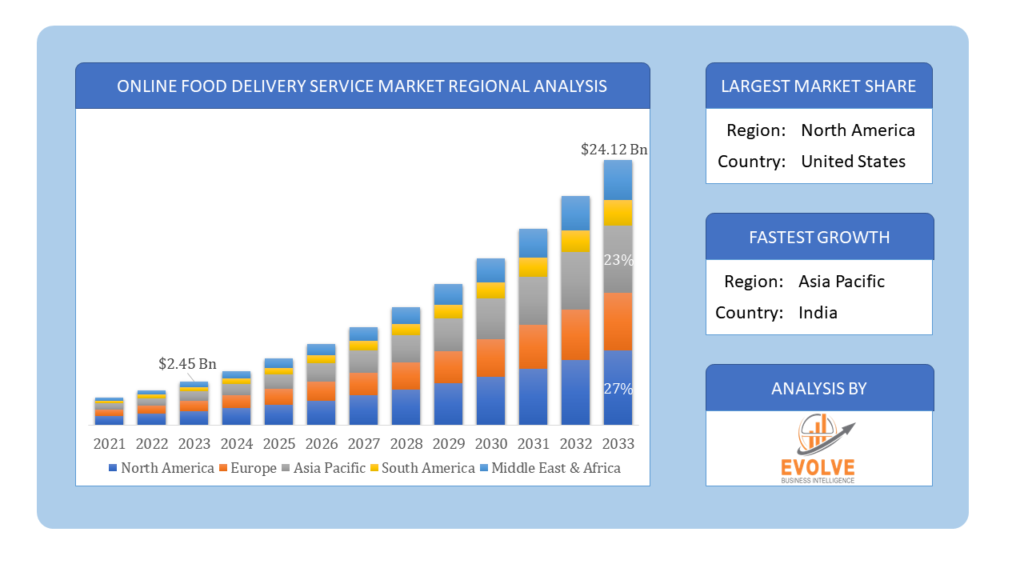Online Food Delivery Service Market Analysis and Global Forecast 2023-2033
$ 1,390.00 – $ 5,520.00Price range: $ 1,390.00 through $ 5,520.00
Online Food Delivery Service Market Research Report: Information By Type (Platform-to-Customer, Restaurant-to-Customer) By Sales Channel (Websites, Mobile Applications) By Payment Method (Cash on Delivery, Online payment), and by Region — Forecast till 2033
Page: 164
Online Food Delivery Service Market Overview
The Online Food Delivery Service Market Size is expected to reach USD 24.12 Billion by 2033. The Online Food Delivery Service Market industry size accounted for USD 2.45 Billion in 2023 and is expected to expand at a compound annual growth rate (CAGR) of 8.41% from 2023 to 2033. The online food delivery service market is a sector of the economy focused on businesses that deliver prepared food and drinks to customers who place orders through websites or mobile apps. It allows you to browse menus, choose dishes from various restaurants, and have them conveniently delivered to your doorstep.
The online food delivery service market is experiencing significant growth due to factors like More people have access to the internet, making online ordering easier. Busy schedules make convenient meal options more appealing. Mobile apps allow for easy on-the-go ordering. More people living in urban areas tend to order food online.
Global Online Food Delivery Service Market Synopsis
The COVID-19 pandemic had a significant impact on the Online Food Delivery Service Market. With lockdowns, social distancing measures, and restaurant closures, consumers turned to online food delivery services as a safer and more convenient alternative. This led to a surge in demand for these services. Many consumers who had never used online food delivery services before began doing so during the pandemic. This expanded the customer base and introduced new demographics to these platforms. The market saw innovations such as contactless delivery, improved hygiene protocols, and enhanced digital payment options to address safety concerns. Restaurants and delivery platforms also adapted by expanding delivery menus and offering meal kits or grocery delivery. The market became more competitive as new players entered and existing platforms intensified their efforts to capture market share. This led to aggressive marketing and pricing strategies.
Online Food Delivery Service Market Dynamics
The major factors that have impacted the growth of Online Food Delivery Service Market are as follows:
Drivers:
Ø Technological Advancements
User-friendly platforms that facilitate browsing, ordering, and payment enhance the overall customer experience. Seamless integration with various digital payment methods, including credit cards, mobile wallets, and even cryptocurrencies, make transactions convenient. Increasing reliance on digital services in daily life has extended to food ordering and delivery. Improved delivery logistics, including real-time tracking and optimized routing, enhance service efficiency. Extending delivery coverage areas to reach more customers, even in less densely populated regions. Growing consumer preference for sustainable and environmentally friendly packaging solutions boosts market attractiveness.
Restraint:
- Perception of High Operational Costs
Managing a large network of delivery personnel, ensuring timely deliveries, and maintaining vehicles can be expensive. Developing and maintaining user-friendly apps and websites, along with the necessary backend infrastructure, requires significant investment. Concerns about the freshness and safety of delivered food can deter potential customers. Protecting customer data from breaches and misuse is critical to maintaining trust.
Opportunity:
⮚ Technology Integration
Leveraging AI for personalized recommendations, efficient delivery routing, and demand forecasting. Integrating with smart home devices to enable voice-activated food ordering. Using augmented reality (AR) and virtual reality (VR) for interactive menu displays and immersive experiences. Expanding menus to include organic, gluten-free, vegan, and other health-conscious options. Providing detailed nutritional information and health benefits of menu items to attract health-focused customers. Exploring the use of drones and autonomous vehicles to reduce delivery times and costs. Establishing localized fulfillment centers to speed up delivery processes and reduce logistical challenges.
Online Food Delivery Service Market Segment Overview
By Type
 Based on Type, the market is segmented based on Platform-to-Customer and Restaurant-to-Customer. The platform-to-consumer segment dominant the market. The “Platform to Consumer” segment in the online food delivery market is experiencing rapid growth for several compelling reasons. Firstly, it offers consumers unparalleled convenience by aggregating a wide range of restaurant choices in one app or website, simplifying the ordering process.
Based on Type, the market is segmented based on Platform-to-Customer and Restaurant-to-Customer. The platform-to-consumer segment dominant the market. The “Platform to Consumer” segment in the online food delivery market is experiencing rapid growth for several compelling reasons. Firstly, it offers consumers unparalleled convenience by aggregating a wide range of restaurant choices in one app or website, simplifying the ordering process.
By Sales Channel
Based on Sales Channel, the market segment has been divided into the Websites and Mobile Applications. The mobile applications segment is anticipated to dominant the market. The “Mobile Applications” segment in the online food delivery market pertains to the channel type through which customers access food delivery services via dedicated mobile applications on their smartphones or tablets.
By Payment Method
Based on Payment Method, the market segment has been divided into the Cash on Delivery and Online payment. The online segment hold the largest market. The demand for the “online” payment segment in the online food delivery market is on the rise due to several compelling reasons. Firstly, it offers a convenient and contactless payment option, which has gained significance in light of health and safety concerns, such as the COVID-19 pandemic. Secondly, online payments provide users with a seamless, cashless experience, reducing the need for physical currency.
Global Online Food Delivery Service Market Regional Analysis
Based on region, the global Online Food Delivery Service Market has been divided into North America, Europe, Asia-Pacific, the Middle East & Africa, and Latin America. North America is projected to dominate the use of the Online Food Delivery Service Market followed by the Asia-Pacific and Europe regions.
 Online Food Delivery Service North America Market
Online Food Delivery Service North America Market
North America holds a dominant position in the Online Food Delivery Service Market. North America has high demand for convenience and variety, with a strong preference for on-demand services. Increasing adoption of subscription models and partnerships with local and niche restaurants. High smartphone penetration and a culture of convenience drive market growth.
Online Food Delivery Service Asia-Pacific Market
The Asia-Pacific region has indeed emerged as the fastest-growing market for the Online Food Delivery Service Market industry. Asia-Pacific is rapidly growing market with high mobile penetration and a preference for digital services. Increasing adoption of innovative technologies like AI for personalized recommendations and drone deliveries.
Competitive Landscape
The global Online Food Delivery Service Market is highly competitive, with numerous players offering a wide range of software solutions. The competitive landscape is characterized by the presence of established companies, as well as emerging startups and niche players. To increase their market position and attract a wide consumer base, the businesses are employing various strategies, such as product launches, and strategic alliances.
Prominent Players:
- Uber Eats
- Zomato
- Swiggy
- Domino’s Pizza
- Foodpanda
- Just Eat
- Pizza Hut
- Deliveroo
Key Development
In August 2023, Zomato Launched a quick commerce grocery delivery service in India, competing with established players like Swiggy.
In March 2023, Doordash Expanded its grocery delivery service through a partnership with national grocery store chain Albertsons
Scope of the Report
Global Online Food Delivery Service Market, by Type
- Platform-to-Customer
- Restaurant-to-Customer
Global Online Food Delivery Service Market, by Sales Channel
- Websites
- Mobile Applications
Global Online Food Delivery Service Market, by Payment Method
- Cash on Delivery
- Online payment
Global Online Food Delivery Service Market, by Region
- North America
- US
- Canada
- Mexico
- Europe
- UK
- Germany
- France
- Italy
- Spain
- Benelux
- Nordic
- Rest of Europe
- Asia Pacific
- China
- Japan
- South Korea
- Indonesia
- Austalia
- Malaysia
- India
- Rest of Asia Pacific
- South America
- Brazil
- Argentina
- Rest of South America
- Middle East & Africa
- Saudi Arabia
- UAE
- Egypt
- South Africa
- Rest of Middle East & Africa
| Parameters | Indicators |
|---|---|
| Market Size | 2033: $24.12 Billion |
| CAGR | 8.41% CAGR (2023-2033) |
| Base year | 2022 |
| Forecast Period | 2023-2033 |
| Historical Data | 2021 |
| Report Coverage | Revenue Forecast, Competitive Landscape, Growth Factors, and Trends |
| Key Segmentations | Type, Sales Channel, Payment Method |
| Geographies Covered | North America, Europe, Asia-Pacific, Latin America, Middle East, Africa |
| Key Vendors | Uber Eats, Zomato, Swiggy, Domino’s Pizza, Foodpanda, Just Eat, Pizza Hut and Deliveroo |
| Key Market Opportunities | • Technology Integration • Health and Wellness Focus |
| Key Market Drivers | • Technological Advancements • Improved Logistics and Infrastructure |
REPORT CONTENT BRIEF:
- High-level analysis of the current and future Online Food Delivery Service Market trends and opportunities
- Detailed analysis of current market drivers, restraining factors, and opportunities in the future
- Online Food Delivery Service Market historical market size for the year 2021, and forecast from 2023 to 2033
- Online Food Delivery Service Market share analysis at each product level
- Competitor analysis with detailed insight into its product segment, Government & Defense strength, and strategies adopted.
- Identifies key strategies adopted including product launches and developments, mergers and acquisitions, joint ventures, collaborations, and partnerships as well as funding taken and investment done, among others.
- To identify and understand the various factors involved in the global Online Food Delivery Service Market affected by the pandemic
- To provide a detailed insight into the major companies operating in the market. The profiling will include the Government & Defense health of the company’s past 2-3 years with segmental and regional revenue breakup, product offering, recent developments, SWOT analysis, and key strategies.
Press Release

Global Pharmaceutical Manufacturing Market to Reach $1.38 Trillion by 2035 with 7.35% CAGR, New Research Shows

The Global Mammography Market Is Estimated To Record a CAGR of Around 10.29% During The Forecast Period

Glue Stick Market to Reach USD 2.35 Billion by 2034

Podiatry Service Market to Reach USD 11.88 Billion by 2034

Microfluidics Technology Market to Reach USD 32.58 Billion by 2034

Ferric Chloride Market to Reach USD 10.65 Billion by 2034

Family Practice EMR Software Market to Reach USD 21.52 Billion by 2034

Electric Hairbrush Market to Reach USD 15.95 Billion by 2034

Daily Bamboo Products Market to Reach USD 143.52 Billion by 2034

Cross-border E-commerce Logistics Market to Reach USD 112.65 Billion by 2034
Frequently Asked Questions (FAQ)
What is the study period of the Online Food Delivery Service Market Overview?
The study period for the Online Food Delivery Service Market Overview spans from 2023 to 2033.
What is the growth rate of the Online Food Delivery Service Market Overview?
The Online Food Delivery Service Market Overview is expected to grow at a compound annual growth rate (CAGR) of 8.41% from 2023 to 2033.
Which region has the highest growth rate in the Online Food Delivery Service Market Overview?
The Asia-Pacific region has the highest growth rate in the Online Food Delivery Service Market Overview.
Which region has the largest share of the Online Food Delivery Service Market Overview?
North America holds the largest share of the Online Food Delivery Service Market Overview.
Who are the key players in the Online Food Delivery Service Market Overview?
Key players in the Online Food Delivery Service Market Overview include Uber Eats, Zomato, Swiggy, Domino’s Pizza, Foodpanda, Just Eat, Pizza Hut, and Deliveroo.
Do you offer Post sales support?
Yes, we offer 16 hours of analyst support to solve the queries
Do you sell particular sections of a report?
Yes, we provide regional as well as country-level reports. Other than this we also provide a sectional report. Please get in contact with our sales representatives.
Table of Content
CHAPTER 1. Executive Summary CHAPTER 2. Scope of the Study 2.1. Market Definition 2.2. Market Scope & Segmentation 2.2.1. Objective of Report CHAPTER 3. Evolve BI Methodology 3.1. Data Collection & Validation Approach 3.2. Market Size Estimation and Forecast CHAPTER 4. Exclusive Analysis 4.1. Market Opportunity Score 4.1.1. Type Segement – Market Opportunity Score 4.1.2. Sales Channel Segment – Market Opportunity Score 4.1.3. Payment Method Segment – Market Opportunity Score 4.2. Key Market Influencing Indicators CHAPTER 5. Market Insights and Trends 5.1. Value Chain Analysis 5.1.1. Raw Material 5.1.2. Manufacturing Process 5.1.3. Distribution Channel 5.1.4. End User 5.2. Porter’s Five Forces Analysis 5.2.1. Bargaining Power of Buyers 5.2.2. Bargaining Power of Suppliers 5.2.3. Threat of New Entrant 5.2.4. Threat of Substitute 5.2.5. Industry Rivalry 5.3. COVID-19 Impact and Post COVID Scenario on Online Food Delivery Service Market 5.3.1. Impact of COVID-19 5.3.2. Government Support and Industry Revival Policies 5.3.3. Measures Taken by Companies to Mitigate Negative Impact 5.3.4. Post COVID Trend CHAPTER 6. Market Dynamics 6.1. Introduction 6.2. Drivers 6.2.1. Driver 1 6.2.2. Driver 2 6.2.3. Driver 3 6.3. Restraints 6.3.1. Restraint 1 6.3.2. Restraint 2 6.4. Opportunity 6.4.1. Opportunity 1 CHAPTER 7. Online Food Delivery Service Market, By Type 7.1. Introduction 7.1.1. Platform-to-Customer 7.1.2. Restaurant-to-Customer CHAPTER 8. Online Food Delivery Service Market, By Sales Channel 8.1. Introduction 8.1.1. Websites 8.1.2. Mobile Applications CHAPTER 9. Online Food Delivery Service Market, By Payment Method 9.1. Introduction 9.1.1. Cash on Delivery 9.1.2 Online payment CHAPTER 10. Online Food Delivery Service Market, By Region 10.1. Introduction 10.2. NORTH AMERICA 10.2.1. North America: Market Size and Forecast, By Country, 2023 – 2033 ($ Million) 10.2.2. North America: Market Size and Forecast, By Type, 2023 – 2033 ($ Million) 10.2.3. North America: Market Size and Forecast, By Sales Channel, 2023 – 2033 ($ Million) 10.2.4. North America: Market Size and Forecast, By Payment Method, 2023 – 2033 ($ Million) 10.2.5. US 10.2.5.1. US: Market Size and Forecast, By Type, 2023 – 2033 ($ Million) 10.2.5.2. US: Market Size and Forecast, By Sales Channel, 2023 – 2033 ($ Million) 10.2.5.3. US: Market Size and Forecast, By Payment Method, 2023 – 2033 ($ Million) 10.2.6. CANADA 10.2.6.1. Canada: Market Size and Forecast, By Type, 2023 – 2033 ($ Million) 10.2.6.2. Canada: Market Size and Forecast, By Sales Channel, 2023 – 2033 ($ Million) 10.2.6.3. Canada: Market Size and Forecast, By Payment Method, 2023 – 2033 ($ Million) 10.2.7. MEXICO 10.2.7.1. Mexico: Market Size and Forecast, By Type, 2023 – 2033 ($ Million) 10.2.7.2. Mexico: Market Size and Forecast, By Sales Channel, 2023 – 2033 ($ Million) 10.2.7.3. Mexico: Market Size and Forecast, By Payment Method, 2023 – 2033 ($ Million) 10.3. Europe 10.3.1. Europe: Market Size and Forecast, By Country, 2023 – 2033 ($ Million) 10.3.2. Europe: Market Size and Forecast, By Type, 2023 – 2033 ($ Million) 10.3.3. Europe: Market Size and Forecast, By Sales Channel, 2023 – 2033 ($ Million) 10.3.4. Europe: Market Size and Forecast, By Payment Method, 2023 – 2033 ($ Million) 10.3.5. U.K. 10.3.5.1. U.K.: Market Size and Forecast, By Type, 2023 – 2033 ($ Million) 10.3.5.2. U.K.: Market Size and Forecast, By Sales Channel, 2023 – 2033 ($ Million) 10.3.5.3. U.K.: Market Size and Forecast, By Payment Method, 2023 – 2033 ($ Million) 10.3.6. GERMANY 10.3.6.1. Germany: Market Size and Forecast, By Type, 2023 – 2033 ($ Million) 10.3.6.2. Germany: Market Size and Forecast, By Sales Channel, 2023 – 2033 ($ Million) 10.3.6.3. Germany: Market Size and Forecast, By Payment Method, 2023 – 2033 ($ Million) 10.3.7. FRANCE 10.3.7.1. France: Market Size and Forecast, By Type, 2023 – 2033 ($ Million) 10.3.7.2. France: Market Size and Forecast, By Sales Channel, 2023 – 2033 ($ Million) 10.3.7.3. France: Market Size and Forecast, By Payment Method, 2023 – 2033 ($ Million) 10.3.8. ITALY 10.3.8.1. Italy: Market Size and Forecast, By Type, 2023 – 2033 ($ Million) 10.3.8.2. Italy: Market Size and Forecast, By Sales Channel, 2023 – 2033 ($ Million) 10.3.8.3. Italy: Market Size and Forecast, By Payment Method, 2023 – 2033 ($ Million) 10.3.9. SPAIN 10.3.9.1. Spain: Market Size and Forecast, By Type, 2023 – 2033 ($ Million) 10.3.9.2. Spain: Market Size and Forecast, By Sales Channel, 2023 – 2033 ($ Million) 10.3.9.3. Spain: Market Size and Forecast, By Payment Method, 2023 – 2033 ($ Million) 10.3.10. BENELUX 10.3.10.1. BeNeLux: Market Size and Forecast, By Type, 2023 – 2033 ($ Million) 10.3.10.2. BeNeLux: Market Size and Forecast, By Sales Channel, 2023 – 2033 ($ Million) 10.3.10.3. BeNeLux: Market Size and Forecast, By Payment Method, 2023 – 2033 ($ Million) 10.3.11. RUSSIA 10.3.11.1. Russia: Market Size and Forecast, By Type, 2023 – 2033 ($ Million) 10.3.11.2. Russia: Market Size and Forecast, By Sales Channel, 2023 – 2033 ($ Million) 10.3.11.3. Russia: Market Size and Forecast, By Payment Method, 2023 – 2033 ($ Million) 10.3.12. REST OF EUROPE 10.3.12.1. Rest of Europe: Market Size and Forecast, By Type, 2023 – 2033 ($ Million) 10.3.12.2. Rest of Europe: Market Size and Forecast, By Sales Channel, 2023 – 2033 ($ Million) 10.3.12.3. Rest of Europe: Market Size and Forecast, By Payment Method, 2023 – 2033 ($ Million) 10.4. Asia Pacific 10.4.1. Asia Pacific: Market Size and Forecast, By Country, 2023 – 2033 ($ Million) 10.4.2. Asia Pacific: Market Size and Forecast, By Type, 2023 – 2033 ($ Million) 10.4.3. Asia Pacific: Market Size and Forecast, By Sales Channel, 2023 – 2033 ($ Million) 10.4.4. Asia Pacific: Market Size and Forecast, By Payment Method, 2023 – 2033 ($ Million) 10.4.5. CHINA 10.4.5.1. China: Market Size and Forecast, By Type, 2023 – 2033 ($ Million) 10.4.5.2. China: Market Size and Forecast, By Sales Channel, 2023 – 2033 ($ Million) 10.4.5.3. China: Market Size and Forecast, By Payment Method, 2023 – 2033 ($ Million) 10.4.6. JAPAN 10.4.6.1. Japan: Market Size and Forecast, By Type, 2023 – 2033 ($ Million) 10.4.6.2. Japan: Market Size and Forecast, By Sales Channel, 2023 – 2033 ($ Million) 10.4.6.3. Japan: Market Size and Forecast, By Payment Method, 2023 – 2033 ($ Million) 10.4.7. INDIA 10.4.7.1. India: Market Size and Forecast, By Type, 2023 – 2033 ($ Million) 10.4.7.2. India: Market Size and Forecast, By Sales Channel, 2023 – 2033 ($ Million) 10.4.7.3. India: Market Size and Forecast, By Payment Method, 2023 – 2033 ($ Million) 10.4.8. SOUTH KOREA 10.4.8.1. South Korea: Market Size and Forecast, By Type, 2023 – 2033 ($ Million) 10.4.8.2. South Korea: Market Size and Forecast, By Sales Channel, 2023 – 2033 ($ Million) 10.4.8.3. South Korea: Market Size and Forecast, By Payment Method, 2023 – 2033 ($ Million) 10.4.9. THAILAND 10.4.9.1. Thailand: Market Size and Forecast, By Type, 2023 – 2033 ($ Million) 10.4.9.2. Thailand: Market Size and Forecast, By Sales Channel, 2023 – 2033 ($ Million) 10.4.9.3. Thailand: Market Size and Forecast, By Payment Method, 2023 – 2033 ($ Million) 10.4.10. INDONESIA 10.4.10.1. Indonesia: Market Size and Forecast, By Type, 2023 – 2033 ($ Million) 10.4.10.2. Indonesia: Market Size and Forecast, By Sales Channel, 2023 – 2033 ($ Million) 10.4.10.3. Indonesia: Market Size and Forecast, By Payment Method, 2023 – 2033 ($ Million) 10.4.11. MALAYSIA 10.4.11.1. Malaysia: Market Size and Forecast, By Type, 2023 – 2033 ($ Million) 10.4.11.2. Malaysia: Market Size and Forecast, By Sales Channel, 2023 – 2033 ($ Million) 10.4.11.3. Malaysia: Market Size and Forecast, By Payment Method, 2023 – 2033 ($ Million) 10.4.12. AUSTRALIA 10.4.12.1. Australia: Market Size and Forecast, By Type, 2023 – 2033 ($ Million) 10.4.12.2. Australia: Market Size and Forecast, By Sales Channel, 2023 – 2033 ($ Million) 10.4.12.3. Australia: Market Size and Forecast, By Payment Method, 2023 – 2033 ($ Million) 10.4.13. REST FO ASIA PACIFIC 10.4.13.1. Rest fo Asia Pacific: Market Size and Forecast, By Type, 2023 – 2033 ($ Million) 10.4.13.2. Rest fo Asia Pacific: Market Size and Forecast, By Sales Channel, 2023 – 2033 ($ Million) 10.4.13.3. Rest fo Asia Pacific: Market Size and Forecast, By Payment Method, 2023 – 2033 ($ Million) 10.5. South America 10.5.1. South America: Market Size and Forecast, By Country, 2023 – 2033 ($ Million) 10.5.2. South America: Market Size and Forecast, By Type, 2023 – 2033 ($ Million) 10.5.3. South America: Market Size and Forecast, By Sales Channel, 2023 – 2033 ($ Million) 10.5.4. South America: Market Size and Forecast, By Payment Method, 2023 – 2033 ($ Million) 10.5.5. BRAZIL 10.5.5.1. Brazil: Market Size and Forecast, By Type, 2023 – 2033 ($ Million) 10.5.5.2. Brazil: Market Size and Forecast, By Sales Channel, 2023 – 2033 ($ Million) 10.5.5.3. Brazil: Market Size and Forecast, By Payment Method, 2023 – 2033 ($ Million) 10.5.6. ARGENTINA 10.5.6.1. Argentina: Market Size and Forecast, By Type, 2023 – 2033 ($ Million) 10.5.6.2. Argentina: Market Size and Forecast, By Sales Channel, 2023 – 2033 ($ Million) 10.5.6.3. Argentina: Market Size and Forecast, By Payment Method, 2023 – 2033 ($ Million) 10.5.7. REST OF SOUTH AMERICA 10.5.7.1. Rest of South America: Market Size and Forecast, By Type, 2023 – 2033 ($ Million) 10.5.7.2. Rest of South America: Market Size and Forecast, By Sales Channel, 2023 – 2033 ($ Million) 10.5.7.3. Rest of South America: Market Size and Forecast, By Payment Method, 2023 – 2033 ($ Million) 10.6. Middle East & Africa 10.6.1. Middle East & Africa: Market Size and Forecast, By Country, 2023 – 2033 ($ Million) 10.6.2. Middle East & Africa: Market Size and Forecast, By Type, 2023 – 2033 ($ Million) 10.6.3. Middle East & Africa: Market Size and Forecast, By Sales Channel, 2023 – 2033 ($ Million) 10.6.4. Middle East & Africa: Market Size and Forecast, By Payment Method, 2023 – 2033 ($ Million) 10.6.5. SAUDI ARABIA 10.6.5.1. Saudi Arabia: Market Size and Forecast, By Type, 2023 – 2033 ($ Million) 10.6.5.2. Saudi Arabia: Market Size and Forecast, By Sales Channel, 2023 – 2033 ($ Million) 10.6.5.3. Saudi Arabia: Market Size and Forecast, By Payment Method, 2023 – 2033 ($ Million) 10.6.6. UAE 10.6.6.1. UAE: Market Size and Forecast, By Type, 2023 – 2033 ($ Million) 10.6.6.2. UAE: Market Size and Forecast, By Sales Channel, 2023 – 2033 ($ Million) 10.6.6.3. UAE: Market Size and Forecast, By Payment Method, 2023 – 2033 ($ Million) 10.6.7. EGYPT 10.6.7.1. Egypt: Market Size and Forecast, By Type, 2023 – 2033 ($ Million) 10.6.7.2. Egypt: Market Size and Forecast, By Sales Channel, 2023 – 2033 ($ Million) 10.6.7.3. Egypt: Market Size and Forecast, By Payment Method, 2023 – 2033 ($ Million) 10.6.8. SOUTH AFRICA 10.6.8.1. South Africa: Market Size and Forecast, By Type, 2023 – 2033 ($ Million) 10.6.8.2. South Africa: Market Size and Forecast, By Sales Channel, 2023 – 2033 ($ Million) 10.6.8.3. South Africa: Market Size and Forecast, By Payment Method, 2023 – 2033 ($ Million) 10.6.9. REST OF MIDDLE EAST & AFRICA 10.6.9.1. Rest of Middle East & Africa: Market Size and Forecast, By Type, 2023 – 2033 ($ Million) 10.6.9.2.____ Rest of Middle East & Africa: Market Size and Forecast, By Sales Channel, 2023 – 2033 ($ Million) 10.6.9.3._ Rest of Middle East & Africa: Market Size and Forecast, By Payment Method, 2023 – 2033 ($ Million) CHAPTER 12. Competitive Landscape 12.1. Competitior Benchmarking 2023 12.2. Market Share Analysis 12.3. Key Developments Analysis By Top 5 Companies 12.4. Market Share Acquisition Strategies: Analysis of Key Approaches Employed by Top Players CHAPTER 13. Company Profiles 13.1. Uber Eats 13.1.1. Hanon Systems 13.1.2. Financial Analysis 13.1.2.1. Business Segment Revenue, 2020, 2021, 2022, $ Million 13.1.2.2. Geographic Revenue Mix, 2022 (% Share) 13.1.3. Product Portfolio 13.1.4. Recent Development and Strategies Adopted 13.1.5. SWOT Analysis 13.2. Zomato 13.3. Swiggy 13.4. Domino’s Pizza 13.5. Foodpanda 13.6. Just Eat 13.7. Pizza Hut 13.8. Deliveroo
Connect to Analyst
Research Methodology








